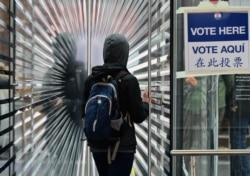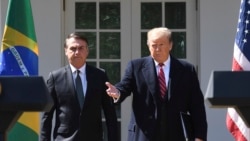On November 23, more than two weeks after news networks declared Democrat Joe Biden victor in the 2020 U.S. presidential election, the U.S. government’s General Services Administration acknowledged Biden as the presumptive winner and approved the start of a transition. Despite a profusion of protests and unsubstantiated claims of widespread voter fraud, President Donald Trump himself accepted the transition call and said he would leave office if the Electoral College formally accepts the results.
The following day, Rodrigo Constantino, a conservative Brazilian commentator who lives in the U.S. and has a large social media following, nonetheless continued to dispute the election results on Opiniao no Ar (Opinion on Air), a program broadcast by Rede TV news network. During the broadcast, which had nearly 148,000 views on YouTube alone, Constantino made several false or unsubstantiated claims regarding voting machines, voter fraud and the involvement of Big Tech in swaying voters.
Brazilian President Jair Bolsonaro is a Trump ally and one of the few world leaders who have not congratulated Biden. Bolsonaro’s sons have also spread disinformation about the U.S. election. Constantino is a critic of the political left in Brazil and a supporter of Bolsonaro, who has praised him publicly.
Polygraph.info examined three of Constantino’s assertions, all of which were also made by Trump’s personal lawyer Rudy Giuliani, the former New York mayor who is leading the Trump campaign’s legal efforts to challenge the election results.
Statement: “There is a lot of debate about Dominion, a company that has ties to the other one in Venezuela.”
When replying to a question from a viewer about machine-counting of ballots in the election, Constantino relied on widely circulated claims that several news outlets have already been debunked (here, here and here).
In mid-November, for example, the pro-Trump One America News Network (OANN) accused Dominion, a company that sells electronic voting hardware and software, including voting machines and tabulators, in the United States and Canada, of stealing “as many as 435,000 votes from President Trump to Joe Biden.” The network said its claim was based on “an unaudited analysis of data obtained from Edison Research.”
Giuliani also has cited Dominion in his conspiracy claims, which were picked up by the president himself, who tweeted in all caps on November 12: “DOMINION DELETED 2.7 MILLION TRUMP VOTES NATIONWIDE.”
To be clear, some Dominion software did have issues during the election, although none of those issues apparently affected vote counts. As The New York Times reported, the company’s software “was used in only two of the five counties that had problems in Michigan and Georgia, and in every instance, there was a detailed explanation for what had happened.”
Nonetheless, Trump’s legal team brought up Dominion during a November 19 news conference. Lawyer Sidney Powell, who has since been dropped from the Trump team, stated that “the Dominion Voting Systems, the Smartmatic technology software, and the software that goes in other computerized voting systems here as well, not just Dominion, were created in Venezuela at the direction of Hugo Chavez.”
That is false. Dominion and Smartmatic – the “other” company referenced by Constantino – are two different firms and competitors. Smartmatic does not own Dominion, as Eddie Perez, a voting technology expert at the OSET Institute, told The Associated Press.
Although Smartmatic’s founder was born in Venezuela, the company was founded in Florida in 2000. The company’s website states that it "has no ties to political parties or groups in any country and abides by a stringent code of ethics that forbids the company to ever donate to any political campaigns of any kind.”
And while the site acknowledges that Smartmatic “did election projects in Venezuela from 2004 to 2017,” it also states that in 2017, Smartmatic “technology helped prove that the [Venezuelan] government was reporting false turnout numbers – so [it] blew the whistle on them – and stopped doing business there.”
On November 26, Dominion issued a statement disputing Powell’s accusations, calling them “baseless, senseless, physically impossible, and unsupported by any evidence whatsoever.” In regard to Venezuela, the statement said:
“Dominion has no ties to the Venezuelan government, nor any other foreign government, including China and Iran. Dominion has never participated in any elections in Venezuela and has no connection or relationship with the now deceased former Venezuelan dictator Hugo Chavez. Other companies have serviced elections in Venezuela, but Dominion is not one of them.”
Statement: “There are complaints, and the complaints from the Republican Party – they are not from Trump – they are very robust. Rudolph Giuliani himself, the former mayor of New York, a respected lawyer, gave numerous indications of it.”
It’s a stretch to say the complaints from Giuliani and the Trump legal team are “not from Trump.” The president has repeated and amplified the claims numerous times on his Twitter account, which has nearly 89 million followers.
NBC News tracked down the status of 40 Trump legal challenges to the election in different states and reported that “most of them have been shot down or withdrawn, and no court has found even a single instance of fraud.”
On November 12, the U.S. Cybersecurity and Infrastructure Security Agency issued a statement saying “the November 3rd election was the most secure in American history.” Trump subsequently fired the agency’s leader, Christopher Krebs, an act that prompted bipartisan criticism.
Statement: “And look, this question of voting by mail is suspicious. Votes that were submitted after hours and without matching signatures … and representatives of the Republican Party not being able access and observe [vote counting].”
Due to the coronavirus pandemic, many Americans preferred to vote by mail this year. With that in mind, many states expanded mail voting and related infrastructure. A record number of mail-in ballots – double those in the 2016 presidential voting – taxed the counting in some states.
Still, Constantino’s claims about late ballots and signatures are misleading.
Each state has specific rules regarding mail-in ballots, and most require them to be received by Election Day (November 3 in this case). More than a dozen states allow ballots to be counted if they are postmarked by November 3, even if they arrived afterward. Washington state, for example, allowed ballots received through November 23 to be counted.
Pennsylvania accepted mail-in ballots until November 6 if postmarked by Election Day. In light of that, the Pennsylvania secretary of state extended the deadline for providing missing proof of identification from November 9 to November 12.
That extension was challenged by the Trump campaign, and a state judge ordered election officials to segregate ballots with voter identification issues. On November 6, U.S. Supreme Court Justice Samuel Alito ordered that ballots received after Election Day in Pennsylvania be segregated pending action by the full Supreme Court. The number of ballots in question isn’t enough to affect Biden’s win in the state.
Signature-matching has been an issue in previous elections. To verify their ballot is authentic, voters sign their ballot return envelope. These signatures are then compared (using computers and by hand) with those on file at elections offices. If they don’t match, ballots can be tossed out, or in some cases voters are given a chance to resolve any apparent differences.
Ballots normally do get rejected. According to Pew Research, nearly 33.5 million mail in ballots were submitted in the 2016 general election, and more than 400,000 (1.2 percent) weren’t counted. Of those, about 28 percent were disqualified because signatures didn’t match.
In the 2018 mid-term U.S. elections, almost 628,000 (2.1 percent) of the 30.2 million domestic civilian mail-in ballots submitted weren’t counted. Of those, 15 percent were dropped for non-matching signatures.
In Georgia, where Biden won by a narrow margin this year, a similar percentage of mail-in ballots were rejected because of signature issues. Citing the Georgia secretary of state’s office, FactCheck.org reported that as an overall percentage of all mail-in ballots cast, “the rejection rate for signature issues was nearly identical in 2020 (0.15%) to what it was in 2018 (0.16%).”
John C. Fortier, director of the Democracy Project at the Bipartisan Policy Center, told The New York Times the signature issues were minor: “There is [no] evidence that there is widespread fraud in any part of the system or absentee system, certainly not in the numbers of millions or nationwide.”
The Trump campaign’s claim of not being able to observe vote counts got little traction.
A judge in Michigan rejected a Trump campaign legal challenge asking that the counting and processing of absentee ballots be halted until “inspectors” from both parties could be physically present at absentee counting boards, and that the Michigan secretary of state order the segregation of all ballots not being inspected and monitored.
In Detroit, according to a Reuters fact check, “Republican and Democrat challengers were allowed inside the room but people from both sides were blocked from re-entering because maximum capacity had been reached.”
In Pennsylvania, Trump campaign lawyers argued in court that observers had been given insufficient access to the vote count. But then, one of the lawyers conceded there had been a “nonzero number of people in the room.” The judge in the case replied: “I'm sorry, then what's your problem?" The Trump campaign’s complaint was rejected.
Philadelphia City Commissioners set up a live web stream so anyone could watch the vote count online. And a judge rejected a Nevada Republican lawsuit which claimed that more than 3,000 ineligible voters had cast ballots. The suit asked that Republican poll watchers be given expanded access to the vote count and that an automated signature matching program be rejected.
According to Forbes magazine, the judge said “Republicans did not provide sufficient evidence to justify their demands.”
Bolsonaro’s sons also have used social media to dispute the U.S. election results and amplify misinformation, including spreading claims about Dominion and a misleading video about a supposed ballot harvesting scheme in Minnesota.
The claim in the video has been debunked, and researchers from Stanford University and University of Washington said it was likely a “coordinated elite disinformation campaign.”
Rodrigo Constantino is popular with the Brazilian president’s supporters. In November, Jove Pan, another conservative news station (also praised by the president), fired Constantino after he said in a video posted on his YouTube channel that he would punish his daughter if she was raped while drunk.










